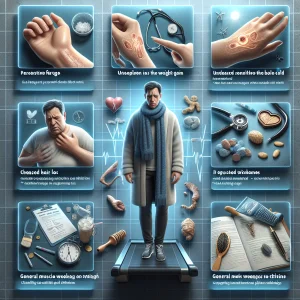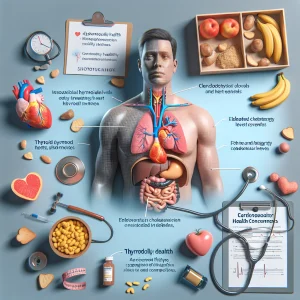Explore the Health Risks Associated with Hypothyroidism in Men: A Detailed Overview
Hypothyroidism in men is a significant health issue defined by the inadequate production of essential thyroid hormones by the thyroid gland, located at the front of the neck. The critical hormones involved, thyroxine (T4) and triiodothyronine (T3), play a vital role in regulating various bodily functions, including metabolism, energy levels, and overall well-being. While this condition can affect anyone, men may experience particular symptoms and challenges that can substantially impact their quality of life. Understanding and acknowledging this health concern is crucial for effective management and treatment strategies.
Recognizing the distinctive traits of hypothyroidism is essential for implementing successful treatment and management approaches. Unfortunately, many men may dismiss the symptoms of hypothyroidism due to their often subtle nature, mistakenly attributing them to stress, lifestyle changes, or normal aging. This common misconception may lead to ongoing discomfort, complications, and a significant decline in overall well-being if the condition is not addressed promptly. Consequently, early detection and diagnosis are vital for achieving optimal health outcomes and maintaining a high standard of living.
Hypothyroidism can arise from various causes, including autoimmune disorders like Hashimoto’s thyroiditis, side effects from certain medications, or complications following radiation therapy. Recognizing and understanding the symptoms early is crucial for timely intervention, which can lead to improved health outcomes and a better quality of life.
Key Facts About Hypothyroidism Every Man Should Know
- Hypothyroidism in men indicates a deficiency in thyroid hormone production by the thyroid gland, leading to physical and psychological health challenges.
- Common physical symptoms include persistent fatigue, unexpected weight gain, thinning hair, and muscle weakness. Health risks also encompass elevated cholesterol levels, an increased risk of heart disease, and potential onset of diabetes.
- Emotional and psychological effects can manifest as depression, anxiety, and cognitive impairments, severely impacting overall quality of life.
- This condition can adversely affect sexual health, resulting in decreased libido, erectile dysfunction, and possible fertility issues.
- Men with hypothyroidism often struggle with weight management, as the condition slows metabolic rates, complicating weight loss efforts and necessitating individualized dietary and exercise plans.
 Recognizing the Physical Symptoms and Health Risks of Hypothyroidism
Recognizing the Physical Symptoms and Health Risks of Hypothyroidism
The physical symptoms of hypothyroidism can vary significantly from one individual to another. Typically, men affected by this condition report experiencing enduring fatigue, unexpected weight gain, increased sensitivity to cold, and generalized muscle weakness. You might find that despite getting a full night’s sleep, you still feel drained or struggle to lose weight even when following a healthy diet and maintaining an active lifestyle.
These frustrating symptoms can lead to self-doubt regarding personal choices and fitness routines, causing further distress. Additionally, hypothyroidism may manifest in less obvious ways, such as noticeable changes in skin texture, including dryness or pallor, along with increased hair loss or thinning. Addressing these symptoms proactively is crucial for effective management and overall improvement in health.
Furthermore, a slowed heart rate may develop, contributing to feelings of lethargy and decreased stamina during physical activities. The cumulative impact of these physical symptoms can significantly disrupt daily life and overall functionality. Therefore, if you suspect that hypothyroidism may be affecting your health, seeking medical guidance is essential.
Investigating the Mental and Emotional Challenges of Living with Hypothyroidism
The mental and emotional repercussions of hypothyroidism are often overlooked but warrant significant attention. As thyroid hormone levels decline, you may experience mood swings, increased feelings of depression, or heightened anxiety. These emotional fluctuations can lead to irritability and fatigue, which may strain personal relationships and diminish overall life satisfaction.
Research highlights the intricate connection between thyroid function and mental health, emphasizing the importance of recognizing this link for effective management. Cognitive functions may also decline due to hypothyroidism, giving rise to what many describe as “brain fog.” You might find it challenging to concentrate, forget small tasks, or feel mentally sluggish, particularly in fast-paced environments where mental clarity is essential.
Identifying these cognitive and emotional symptoms as critical aspects of hypothyroidism is vital for advocating appropriate medical intervention. For deeper insights into the relationship between hypothyroidism and mental health, consider visiting the Mayo Clinic website for comprehensive information.
 The Profound Impact of Hypothyroidism on Men’s Sexual Health
The Profound Impact of Hypothyroidism on Men’s Sexual Health
Hypothyroidism can significantly influence sexual health in men, leading to various complications. Lower levels of thyroid hormones may result in decreased libido, erectile dysfunction, and even infertility. You might experience a noticeable decline in sexual interest or find it challenging to achieve or maintain an erection, which can be distressing.
These sexual health issues can evoke feelings of inadequacy, frustration, or anxiety within intimate relationships. The hormonal imbalances associated with hypothyroidism can further disrupt testosterone levels, complicating an already intricate landscape of sexual health. Low testosterone levels can cause increased fatigue, mood swings, and reduced sexual desire, creating a difficult cycle that may be hard to break.
It is essential to discuss any sexual health concerns with your healthcare provider to explore effective treatment options aimed at restoring both thyroid function and sexual health, ensuring a holistic approach to your overall well-being.
Strategies for Overcoming Weight Management Challenges Due to Hypothyroidism
Weight management can be particularly challenging for men diagnosed with hypothyroidism. The slowed metabolism commonly associated with low thyroid hormone levels can hinder your ability to lose or maintain a healthy weight. Even with regular exercise and a balanced diet, you may find that losing those extra pounds feels like an uphill battle.
This ongoing struggle can lead to significant frustration and feelings of hopelessness regarding weight control. Understanding the link between hypothyroidism and weight gain is essential for developing effective strategies. Collaborating with a healthcare provider can help you create a personalized plan that addresses both thyroid health and weight management objectives.
This collaborative effort may involve medication adjustments, dietary changes, and tailored exercise routines designed to boost metabolism while taking into account your energy levels.
 Exploring the Connection Between Hypothyroidism and Cardiovascular Health Risks
Exploring the Connection Between Hypothyroidism and Cardiovascular Health Risks
The relationship between hypothyroidism and cardiovascular health is a significant concern for men diagnosed with this condition. Insufficient thyroid hormone levels can elevate cholesterol levels, increasing the risk of heart disease over time. It is crucial to understand that the fatigue and lethargy associated with hypothyroidism may not solely be symptoms of the condition; they could also indicate underlying cardiovascular issues that necessitate attention.
Regular cardiovascular health evaluations are essential for individuals with hypothyroidism. Your healthcare provider may suggest lifestyle changes, such as adopting a heart-healthy diet rich in fruits, vegetables, whole grains, and lean proteins. Additionally, engaging in regular physical activity that aligns with your energy levels can enhance thyroid function and promote cardiovascular health. By proactively managing both thyroid health and cardiovascular fitness, you can significantly lower the risk of further complications.
Exploring the Impact of Hypothyroidism on Male Fertility
Fertility challenges are another critical aspect associated with hypothyroidism in men. Low thyroid hormone levels can disrupt the intricate hormonal balance necessary for sperm production and overall reproductive health. If you are encountering difficulties in conceiving, it is vital to consider how your thyroid function may be affecting your fertility journey.
Addressing hypothyroidism through appropriate treatment can not only improve your overall health but also enhance the likelihood of successful conception. Collaborating with a knowledgeable healthcare provider who understands the complex relationship between thyroid function and fertility is essential for developing a comprehensive strategy that addresses both concerns. This approach may include regular monitoring of hormone levels through blood tests and adjusting medications to optimize reproductive health.
Effective Strategies for Managing and Treating Hypothyroidism in Men
Successfully managing hypothyroidism requires a holistic approach that includes regular monitoring through blood tests, medication management, lifestyle changes, and open communication with healthcare providers. Blood tests are essential for diagnosing hypothyroidism, as they assess key indicators such as Thyroid-Stimulating Hormone (TSH) and T4 levels. Elevated TSH levels typically signify an underactive thyroid, while low T4 levels confirm the diagnosis.
Once diagnosed, treatment generally involves hormone replacement therapy using synthetic thyroid hormones, such as levothyroxine. This medication helps restore normal hormone levels, alleviating many of the symptoms associated with hypothyroidism. Regular follow-up appointments are crucial for monitoring treatment effectiveness and making necessary adjustments based on blood test results.
In addition to medication, lifestyle modifications—such as adopting a nutrient-rich diet that supports thyroid health, including sufficient iodine, selenium, and zinc—can be highly beneficial. Engaging in regular exercise tailored to your energy levels can also assist in managing symptoms while improving overall well-being. By actively participating in your health management through education, collaboration with healthcare providers, and lifestyle changes, you can lead a fulfilling life despite the challenges presented by hypothyroidism.
Common Questions About Hypothyroidism in Men
What is hypothyroidism in men?
Hypothyroidism in men refers to a condition where the thyroid gland fails to produce adequate thyroid hormones, resulting in a metabolic slowdown and various health complications.
What symptoms do men commonly experience with hypothyroidism?
Common symptoms in men with hypothyroidism include fatigue, weight gain, sensitivity to cold, dry skin, constipation, muscle weakness, and feelings of depression.
How is hypothyroidism diagnosed in men?
The diagnosis of hypothyroidism in men is established through blood tests that measure levels of thyroid-stimulating hormone (TSH) and thyroxine (T4) in the bloodstream.
What are the primary causes of hypothyroidism in men?
The leading cause of hypothyroidism in men is often an autoimmune disorder known as Hashimoto’s thyroiditis. Other contributing factors may include thyroid surgery, radiation treatment, and certain medications.
What treatment options are available for men with hypothyroidism?
Men diagnosed with hypothyroidism typically receive treatment through synthetic thyroid hormone medications, such as levothyroxine, to replace deficient hormones and restore normal thyroid function.
Can hypothyroidism lead to additional health complications in men?
If left untreated, hypothyroidism in men can result in complications such as heart disease, fertility challenges, and mental health issues. Seeking appropriate treatment is crucial to mitigate these risks.
This Content Is Sponsored By: Thyroid Testing UK
Hypothyroidism in Men: The Impact On Health Was First Published By https://bloodtest.co.uk
Find Us On Facebook: EZ Blood Tests
The Article: Hypothyroidism in Men: Health Implications Explored appeared first on: https://ezbloodtest.com
The Article Hypothyroidism in Men: Exploring Health Implications Was Found On https://limitsofstrategy.com



